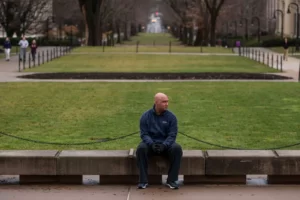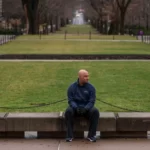How to Write About Coronavirus in a College Essay
Students can share how they navigated life during the coronavirus pandemic in a full-length essay or an optional supplement.
Writing About COVID-19 in College Essays

Getty Images
Experts say students should be honest and not limit themselves to merely their experiences with the pandemic.
The global impact of COVID-19, the disease caused by the novel coronavirus, means colleges and prospective students alike are in for an admissions cycle like no other. Both face unprecedented challenges and questions as they grapple with their respective futures amid the ongoing fallout of the pandemic.
Colleges must examine applicants without the aid of standardized test scores for many – a factor that prompted many schools to go test-optional for now . Even grades, a significant component of a college application, may be hard to interpret with some high schools adopting pass-fail classes last spring due to the pandemic. Major college admissions factors are suddenly skewed.
"I can't help but think other (admissions) factors are going to matter more," says Ethan Sawyer, founder of the College Essay Guy, a website that offers free and paid essay-writing resources.
College essays and letters of recommendation , Sawyer says, are likely to carry more weight than ever in this admissions cycle. And many essays will likely focus on how the pandemic shaped students' lives throughout an often tumultuous 2020.
But before writing a college essay focused on the coronavirus, students should explore whether it's the best topic for them.

Writing About COVID-19 for a College Application
Much of daily life has been colored by the coronavirus. Virtual learning is the norm at many colleges and high schools, many extracurriculars have vanished and social lives have stalled for students complying with measures to stop the spread of COVID-19.
"For some young people, the pandemic took away what they envisioned as their senior year," says Robert Alexander, dean of admissions, financial aid and enrollment management at the University of Rochester in New York. "Maybe that's a spot on a varsity athletic team or the lead role in the fall play. And it's OK for them to mourn what should have been and what they feel like they lost, but more important is how are they making the most of the opportunities they do have?"
That question, Alexander says, is what colleges want answered if students choose to address COVID-19 in their college essay.
But the question of whether a student should write about the coronavirus is tricky. The answer depends largely on the student.
"In general, I don't think students should write about COVID-19 in their main personal statement for their application," Robin Miller, master college admissions counselor at IvyWise, a college counseling company, wrote in an email.
"Certainly, there may be exceptions to this based on a student's individual experience, but since the personal essay is the main place in the application where the student can really allow their voice to be heard and share insight into who they are as an individual, there are likely many other topics they can choose to write about that are more distinctive and unique than COVID-19," Miller says.
Opinions among admissions experts vary on whether to write about the likely popular topic of the pandemic.
"If your essay communicates something positive, unique, and compelling about you in an interesting and eloquent way, go for it," Carolyn Pippen, principal college admissions counselor at IvyWise, wrote in an email. She adds that students shouldn't be dissuaded from writing about a topic merely because it's common, noting that "topics are bound to repeat, no matter how hard we try to avoid it."
Above all, she urges honesty.
"If your experience within the context of the pandemic has been truly unique, then write about that experience, and the standing out will take care of itself," Pippen says. "If your experience has been generally the same as most other students in your context, then trying to find a unique angle can easily cross the line into exploiting a tragedy, or at least appearing as though you have."
But focusing entirely on the pandemic can limit a student to a single story and narrow who they are in an application, Sawyer says. "There are so many wonderful possibilities for what you can say about yourself outside of your experience within the pandemic."
He notes that passions, strengths, career interests and personal identity are among the multitude of essay topic options available to applicants and encourages them to probe their values to help determine the topic that matters most to them – and write about it.
That doesn't mean the pandemic experience has to be ignored if applicants feel the need to write about it.
Writing About Coronavirus in Main and Supplemental Essays
Students can choose to write a full-length college essay on the coronavirus or summarize their experience in a shorter form.
To help students explain how the pandemic affected them, The Common App has added an optional section to address this topic. Applicants have 250 words to describe their pandemic experience and the personal and academic impact of COVID-19.
"That's not a trick question, and there's no right or wrong answer," Alexander says. Colleges want to know, he adds, how students navigated the pandemic, how they prioritized their time, what responsibilities they took on and what they learned along the way.
If students can distill all of the above information into 250 words, there's likely no need to write about it in a full-length college essay, experts say. And applicants whose lives were not heavily altered by the pandemic may even choose to skip the optional COVID-19 question.
"This space is best used to discuss hardship and/or significant challenges that the student and/or the student's family experienced as a result of COVID-19 and how they have responded to those difficulties," Miller notes. Using the section to acknowledge a lack of impact, she adds, "could be perceived as trite and lacking insight, despite the good intentions of the applicant."
To guard against this lack of awareness, Sawyer encourages students to tap someone they trust to review their writing , whether it's the 250-word Common App response or the full-length essay.
Experts tend to agree that the short-form approach to this as an essay topic works better, but there are exceptions. And if a student does have a coronavirus story that he or she feels must be told, Alexander encourages the writer to be authentic in the essay.
"My advice for an essay about COVID-19 is the same as my advice about an essay for any topic – and that is, don't write what you think we want to read or hear," Alexander says. "Write what really changed you and that story that now is yours and yours alone to tell."
Sawyer urges students to ask themselves, "What's the sentence that only I can write?" He also encourages students to remember that the pandemic is only a chapter of their lives and not the whole book.
Miller, who cautions against writing a full-length essay on the coronavirus, says that if students choose to do so they should have a conversation with their high school counselor about whether that's the right move. And if students choose to proceed with COVID-19 as a topic, she says they need to be clear, detailed and insightful about what they learned and how they adapted along the way.
"Approaching the essay in this manner will provide important balance while demonstrating personal growth and vulnerability," Miller says.
Pippen encourages students to remember that they are in an unprecedented time for college admissions.
"It is important to keep in mind with all of these (admission) factors that no colleges have ever had to consider them this way in the selection process, if at all," Pippen says. "They have had very little time to calibrate their evaluations of different application components within their offices, let alone across institutions. This means that colleges will all be handling the admissions process a little bit differently, and their approaches may even evolve over the course of the admissions cycle."
Searching for a college? Get our complete rankings of Best Colleges.
10 Ways to Discover College Essay Ideas

Tags: students , colleges , college admissions , college applications , college search , Coronavirus
2024 Best Colleges

Search for your perfect fit with the U.S. News rankings of colleges and universities.
College Admissions: Get a Step Ahead!
Sign up to receive the latest updates from U.S. News & World Report and our trusted partners and sponsors. By clicking submit, you are agreeing to our Terms and Conditions & Privacy Policy .
Ask an Alum: Making the Most Out of College
You May Also Like
How to decide if an mba is worth it.
Sarah Wood March 27, 2024

What to Wear to a Graduation
LaMont Jones, Jr. March 27, 2024

FAFSA Delays Alarm Families, Colleges
Sarah Wood March 25, 2024

Help Your Teen With the College Decision
Anayat Durrani March 25, 2024

Toward Semiconductor Gender Equity
Alexis McKittrick March 22, 2024

March Madness in the Classroom
Cole Claybourn March 21, 2024

20 Lower-Cost Online Private Colleges
Sarah Wood March 21, 2024

How to Choose a Microcredential
Sarah Wood March 20, 2024

Basic Components of an Online Course
Cole Claybourn March 19, 2024

Can You Double Minor in College?
Sarah Wood March 15, 2024

@bizjournalism

Two Minute Tips

Tips on writing about COVID-19

Susan Johnston Taylor
Share this article:

As readers cope with new realities in response to COVID-19, providing them with clear and accurate information is more important than ever. AP Stylebook held a Twitter chat on March 23 to share style tips on writing about the pandemic, and other experts like Mignon Fogarty of Grammar Girl and Roy Peter Clark of Poynter have shared their own tips.
Savvy reporters use many of these strategies already, but it’s a worth a refresher, especially when they’re writing under tight deadlines or with little sleep. Here’s an overview of their advice with links to additional information.
Use punctuation
Many people feel overwhelmed right now, so the last thing they need is a series of long, complex sentences, especially when that information is crucial to public safety. “Think of the period as a stop sign,” writes Clark in his recent article for Poynter (worth a read in its entirety). “The more stop signs, the slower the pace, which is good if you are trying to make something clear.”
Clark also suggests keeping the subject and verb together near the beginning of the sentence, as overly complex sentences can confuse readers.
Avoid unfamiliar acronyms
Readers may not know that PPE stands for personal protective equipment or that WHO stands for the World Health Organization , so remember to write out the full name on first reference. The AP Stylebook says WHO or the WHO are both acceptable on second reference.
Choose correct terms
Coronavirus is technically a family of viruses, but in the current context, it clearly references a specific virus. Coronavirus and COVID-19 are both correct, according to Fogarty and other sources (never use geographic labels when referencing the name of the virus).
A pandemic is more serious than an epidemic, and the WHO has declared COVID-19 a pandemic , so pandemic is correct. No need to say “global pandemic” as pandemic means the outbreak has spread to several countries or continents.
Merriam-Webster defines some terms recently added to the dictionary such as socially distance.
Know when to hyphenate
When you’re using to-go as an adjective (as in “we placed a to-go-order”), it should be hyphenated, according to Fogarty. However, AP Stylebook says no hyphen in telecommute or videoconference. Ditto on N95 masks . Read AP Stylebook’s coronavirus topical guide for more guidance.
UPDATE: The Canadian Association of Journalists published a list of tips and best practices including safety precautions and tools for working remotely.
- Health care , Pandemic

More Like This...

Reader tips help ProPublica uncover dodgy insurance practices in Barlett & Steele Award-winning series
The Bartlett & Steele Silver Award in the Global/National Category for 2023 went to “Uncovered,” ProPublica’s three-piece investigation into exploitative practices in the health insurance

There is a market for everything – even death.
Ava Kofman, winner of the 2023 Barlett & Steele Award for Outstanding Young Journalist, gave readers a horrifying look into the world of a hospice

Barlett & Steele Award-winning investigation spurs worker protection for deadly lung disease
The top prize in the Regional/Local category of the 2023 Barlett and Steele Awards was given to a collaborative and multi-media investigation of a silicosis
Latest in Health Care

Borderless beauty: How globalization is boosting the cosmetic medical tourism business
Sign up now. get one tuesday..
Every Tuesday we send out a quick-read email with tips for business journalism.
Subscribers also get access to the Tip archive.
Latest Articles
U.s. brands caught in middle of israel-hamas conflict, with protests and boycotts hitting profits, what china’s struggling economy means for the us, global economy, reynolds center graduate assistant wins student media grant award, the big economic impact of black-owned small businesses , how financial institutions are using ai tools.
More Articles »
Coverage Areas
Journalist resources.
Get Two Minute Tips For Business Journalism Delivered To Your Email Every Tuesday
Every Tuesday we send out a quick-read email with tips for business journalism. Sign up now and get one Tuesday.
Search The Reynolds Center

IMAGES
VIDEO
COMMENTS
Writing About Coronavirus in Main and Supplemental Essays. Students can choose to write a full-length college essay on the coronavirus or summarize their experience in a shorter form. To help ...
Having recognized this, the Common App added a new optional 250-word essay that will give universities a chance to understand the atypical high school experience students have had. The prompt will ...
Use clear, accurate language and simple sentences, especially when covering COVID-19. (Photo of someone typing by Kaitlyn Baker via Unsplash) As readers cope with new realities in response to COVID-19, providing them with clear and accurate information is more important than ever. AP Stylebook held a Twitter chat on March 23 to share style tips ...